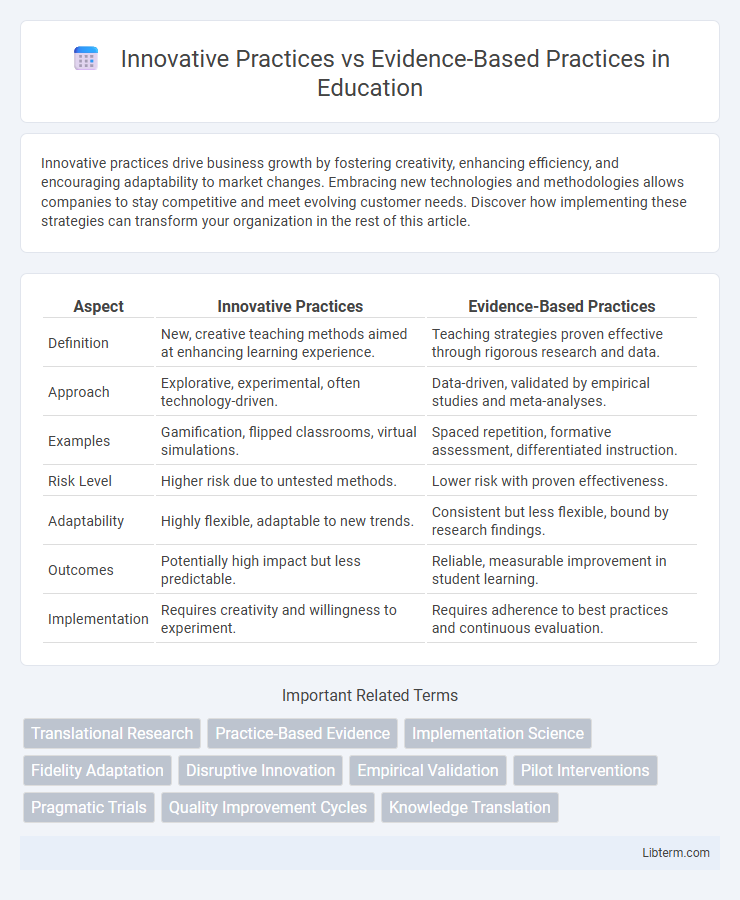Innovative practices drive business growth by fostering creativity, enhancing efficiency, and encouraging adaptability to market changes. Embracing new technologies and methodologies allows companies to stay competitive and meet evolving customer needs. Discover how implementing these strategies can transform your organization in the rest of this article.
Table of Comparison
| Aspect | Innovative Practices | Evidence-Based Practices |
|---|---|---|
| Definition | New, creative teaching methods aimed at enhancing learning experience. | Teaching strategies proven effective through rigorous research and data. |
| Approach | Explorative, experimental, often technology-driven. | Data-driven, validated by empirical studies and meta-analyses. |
| Examples | Gamification, flipped classrooms, virtual simulations. | Spaced repetition, formative assessment, differentiated instruction. |
| Risk Level | Higher risk due to untested methods. | Lower risk with proven effectiveness. |
| Adaptability | Highly flexible, adaptable to new trends. | Consistent but less flexible, bound by research findings. |
| Outcomes | Potentially high impact but less predictable. | Reliable, measurable improvement in student learning. |
| Implementation | Requires creativity and willingness to experiment. | Requires adherence to best practices and continuous evaluation. |
Defining Innovative Practices in Modern Fields
Innovative practices in modern fields refer to novel methods, techniques, or approaches that enhance efficiency, creativity, and problem-solving beyond traditional frameworks. These practices often involve integrating cutting-edge technology, interdisciplinary knowledge, and adaptive strategies to address emerging challenges. Unlike evidence-based practices, which rely on validated research and empirical data, innovative practices emphasize experimentation and rapid iteration to drive progress.
What Are Evidence-Based Practices?
Evidence-based practices (EBPs) are interventions, techniques, or strategies that have been rigorously tested and validated through systematic research and clinical trials, demonstrating consistent effectiveness in achieving desired outcomes. These practices integrate the best available scientific evidence with clinical expertise and patient values to ensure optimal decision-making and care delivery. EBPs emphasize reproducibility, reliability, and data-driven results, distinguishing them from innovative practices that may lack extensive empirical validation.
Key Differences Between Innovative and Evidence-Based Approaches
Innovative practices emphasize novel methods and creative problem-solving that may lack extensive validation, while evidence-based practices rely on rigorous research and empirical data to guide decisions and interventions. Key differences include the level of experimental risk and validation, with innovative approaches often pioneering untested techniques, whereas evidence-based approaches prioritize proven effectiveness and reproducibility. The integration of innovation can lead to new evidence, but evidence-based practice ensures consistency and reliability through systematic review and clinical trials.
Advantages of Implementing Innovative Practices
Implementing innovative practices accelerates organizational adaptability by fostering creative problem-solving and encouraging continuous improvement, leading to unique solutions that traditional evidence-based methods may overlook. These practices enhance competitive advantage through rapid experimentation, allowing real-time feedback integration that drives customized strategies tailored to evolving market demands. Emphasizing innovation cultivates a proactive culture, empowering teams to explore emerging technologies and novel approaches that can disrupt industry norms and deliver superior value.
Benefits of Relying on Evidence-Based Practices
Relying on evidence-based practices enhances decision-making by using scientifically validated data, increasing the likelihood of successful outcomes in healthcare, education, and business. These practices reduce uncertainty and resource waste by prioritizing interventions proven effective through rigorous research and systematic reviews. Evidence-based approaches also improve accountability and replication across diverse settings, fostering continuous improvement and trust among stakeholders.
Challenges in Balancing Innovation and Evidence
Balancing innovation and evidence-based practices presents key challenges including the risk of implementing unproven methods that may compromise patient safety and outcome reliability. Healthcare providers must navigate limited empirical data for novel approaches while ensuring compliance with established clinical guidelines and regulatory standards. Integrating cutting-edge technologies requires continuous evaluation against robust evidence to maintain efficacy and ethical standards.
Case Studies: When Innovation Outpaced Evidence
Case studies reveal instances where innovative practices rapidly transformed fields like education and healthcare before comprehensive evidence validation. In educational technology, novel digital tools were adopted widely despite limited longitudinal studies, showcasing how innovation outpaced rigorous evaluation. Similarly, in healthcare, experimental treatments gained popularity prior to robust clinical trials, highlighting challenges in balancing innovation enthusiasm with evidence-based protocols.
Integrating New Innovations with Proven Practices
Integrating new innovations with proven evidence-based practices enhances the effectiveness of interventions by combining cutting-edge techniques with validated methodologies. This approach fosters continual improvement while maintaining reliability and consistency in outcomes across various fields such as healthcare, education, and technology. Organizations adopting this integration benefit from increased adaptability and improved performance metrics driven by both innovation and empirical validation.
Ethical Considerations in Choosing Practice Approaches
Ethical considerations in selecting practice approaches demand a balance between innovative practices' potential benefits and the proven reliability of evidence-based practices, ensuring client safety and informed consent. Practitioners must evaluate the empirical support for interventions while remaining open to novel methods that address unmet needs or gaps in existing evidence. Upholding transparency about risks, benefits, and limitations supports ethical responsibility and promotes trust in professional decision-making.
Future Trends: Blending Innovation with Evidence
Future trends in healthcare emphasize blending innovative practices with evidence-based methods to optimize patient outcomes and system efficiency. The integration of advanced technologies like artificial intelligence and telemedicine with rigorous clinical trials fosters adaptive, data-driven care models. This synergy enhances personalized treatment plans while maintaining scientific validation, driving progressive yet reliable healthcare evolution.
Innovative Practices Infographic

 libterm.com
libterm.com